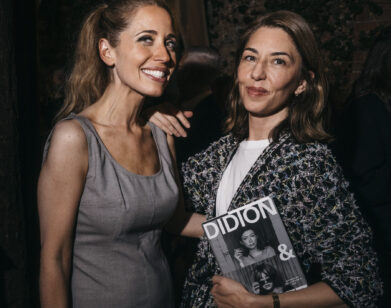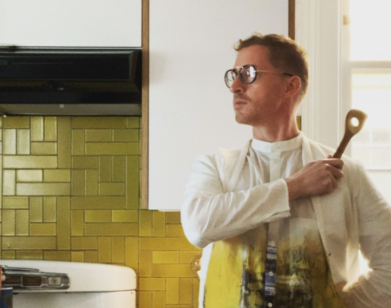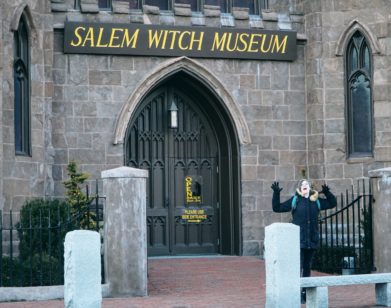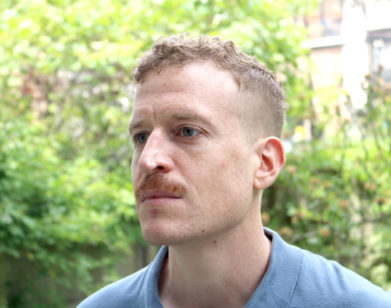5 things
Overpriced Salads and Political Catastrophes Inspired Grant Ginder’s New Novel
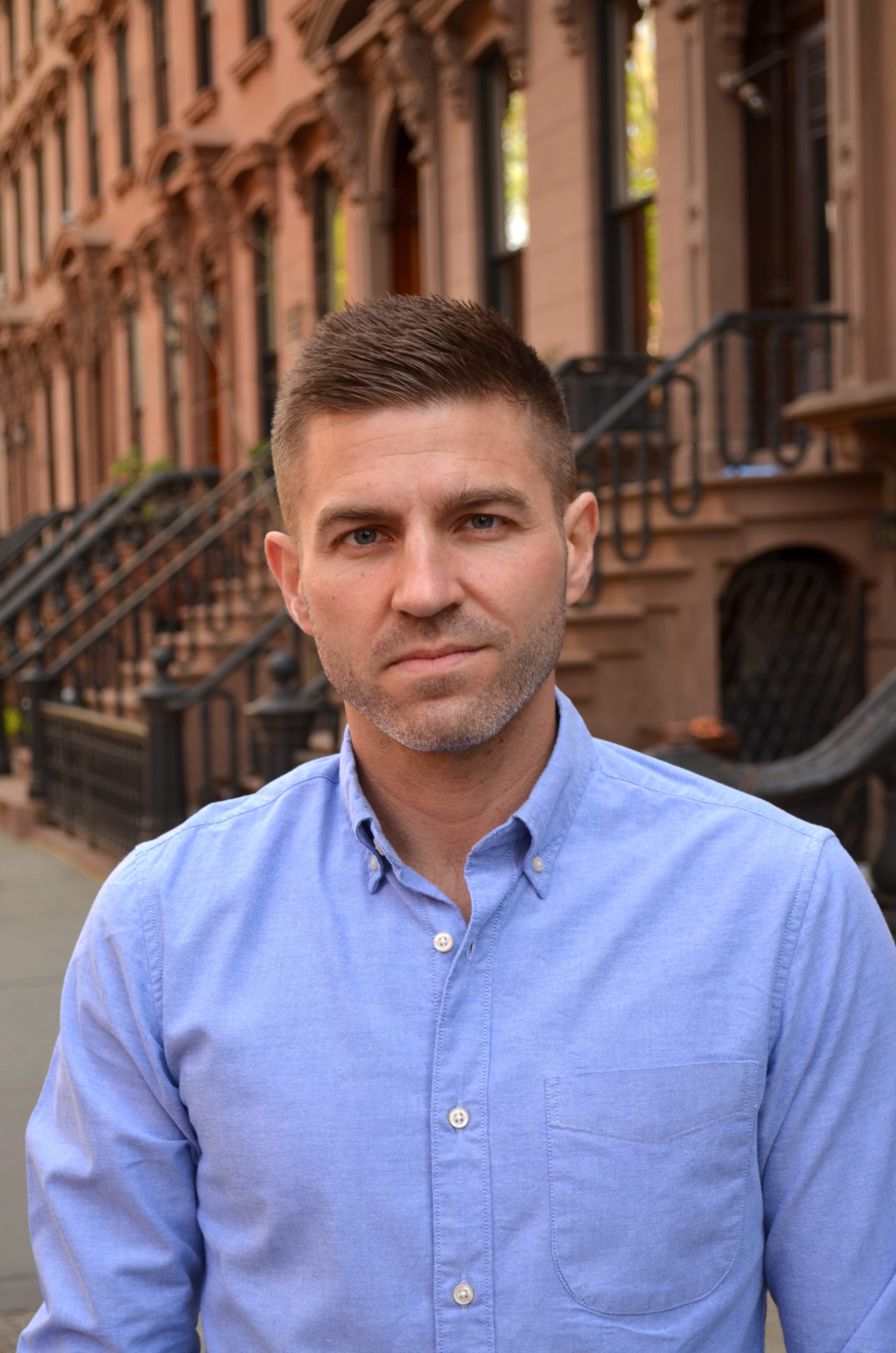
Grant Ginder. Photo by Peter Schottenfels.
Has Grant Ginder written the most fun novel of 2022? “Fun” might be dismissive of a work so steeped in dazzling prose, insightful portraits of young urbanites, and vivid descriptions of New York City and Paris—not to mention a rather timely political agenda—but Let’s Not Do That Again is just about the most enjoyable and hilarious novel of manners to come around in quite some time. Ginder, a New Yorker who has clearly done his research on the Right and Left Banks, tells the story of the Harrisons, a mother running for Senate whose children—Nick, a gay writer working on a Broadway musical about Joan Didion; and Greta, a surly lost cause who falls for the wrong Frenchman and runs amok in Paris—might just cost her the race. At the novel’s heart is a sibling love story, and no one could have written a smarter one. Here, Ginder maps out a few influences—small i—that brought his book to life.—CHRISTOPHER BOLLEN
———
A few weeks ago, I attended a reading where a novelist said, flat-out, that he didn’t believe in inspiration, which got me thinking about my own thorny relationship with the word. To a certain degree, I understand what the novelist was getting at—I’m over a decade into my career, and I can confidently say that I’ve given up on the idea that one singular influence can suddenly spark an entire book. That said, I do think there’s an important distinction to be made between Inspiration with a capital I and the people, places, texts, and events and that inspire us. The former is a mythical lightning bolt that very rarely strikes; the latter is the stuff of life that, if you’re lucky enough to notice it, becomes art. The list of what inspired Let’s Not Do That Again is, like the novel itself, chaotic: it ranges from Parisian restaurants to overpriced salads to political catastrophes. I’ve done my best to gather a few of them here.—GRANT GINDER
———
FOUQUET’s
That bright red awning! That 34-euro steak tartare! It’s hard to think of the Champs-Élysées without conjuring images of this glamorously over-priced restaurant long-favored by France’s elite. To be clear: I’ve never actually been to Fouquet’s— whenever I’m in Paris and I’m tempted to wander in, the idea of taking out a mortgage to order a Caesar salad stops me in my tracks. Greta, the estranged daughter of New York congresswoman Nancy Harrison and the enfant terrible of Let’s Not Do That Again, doesn’t make it through the brasserie’s doors, either. Instead, she hurls a champagne bottle through Fouquet’s windows—an act that’s caught on camera for all the world to see.
———
WEDNESDAY, NOVEMBER 9, 2016
While the plot of Let’s Not Do That Again didn’t really start taking shape until the summer of 2018, its political inspiration came much earlier—namely, on that terrible morning in 2016 when we all woke up to learn that Donald Trump had been elected president. In the days (and weeks, and months, and years) since, I became consumed by the question of how far I—or anyone—would go to protect democracy in the United States. Up until this point, I had naively taken for granted our country’s basic institutions—now, though, I was watching them succumb to brutish incompetence and bigotry. How far would I be willing to bend my own morals and ethics to save them? What would I be willing to look past in the name of some greater good? These are the questions the Harrisons are faced with toward the end of the book, and how they answer them will have repercussions for the rest of their lives.
———
CHEKHOV’S GUN
It’s one of the first things writers learn when they wander into their MFA programs: Chekhov’s old adage that if you introduce a rifle in the first chapter, it better be fired by the second or the third. I’m not some crazy evangelist for the rule, but it was certainly on my mind when I was writing Let’s Not Do That Again. I was reading a ton of mysteries when I conceived of the book, and I was surprised by how much pleasure I got from seeing the pieces of a story fall into place. The satisfaction you feel when you read an Agatha Christie novel doesn’t necessarily come from catching glimpses of a world you recognize, but rather from seeing seemingly-inconsequential details yield outrageous consequences. I wanted to recreate that satisfaction with Let’s Not Do That Again. In my case, Chekhov’s rifle became Chekhov’s trash compactor, but the principle remains the same: I wanted to write a book that was fun.
———
THE ROTISSERIE CHICKEN SALAD AT LAFAYETTE GRAND
On top of being a book about dysfunctional politics and fractured families, Let’s Not Do That Again is a book about salads: people eating them, people talking about them, people getting way too drunk while they totally ignore them. I’ve lived in New York for nearly fifteen years now, and in that time, I think I’ve ordered about eighty-five percent of the salads Manhattan has to offer. Among them, the rotisserie chicken salad at Lafayette Grand reigns supreme. I order it every year on my birthday (along with a few glasses of white wine), so it should come as no surprise that Nancy lauds it in the early pages of Let’s Not Do That Again. “In a town of overpriced salads,” she tells her campaign manager, Cate, “this one is king.”
———
SLOUCHING TOWARD BETHLEHEM, BY JOAN DIDION
When is Didion not an inspiration, is what we should be asking. So says Nick Harrison, who spends much of Let’s Not Do That Again attempting to finish a musical he’s writing about Didion’s early years in New York. The musical is called Hello to All That! and he’s inspired to write it after a particularly rough day of teaching selections from Slouching Toward Bethlehem to his undergraduates at NYU. I should note here that I, too, have had particularly rough days teaching Didion to my undergraduates at NYU, though that never stops me from coming back to her work. If you can understand how a Didion sentence works, I tell them, (as they stare at me skeptically), then you can learn to love writing.

